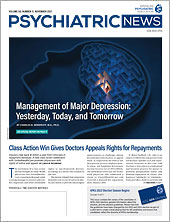Racial and ethnic minorities face unique challenges accessing and utilizing mental health services in the United States. These include lack of insurance, communication barriers, and perceived stigma. Even when minority patients have access to mental health care, they often receive lower quality care and have worse outcomes. The Collaborative Care Model is a well-studied health care delivery model that aims to improve mental health care access and outcomes. Key elements of this model include utilizing patient-centered team care, a population focus through the use of registries, measurement-based treatment to target, and application of evidence-based care. Consult psychiatrists have expanded their participation in collaborative care in primary care and specialty settings and, as a result, are often faced with addressing disparities in care for minority patient populations.
Evidence from our systematic review in the November-December 2020 issue of Psychosomatics (now the Journal of Academy of C-L Psychiatry Systematic Review) shows that collaborative care may be an effective intervention for treating racial/ethnic minority patients for depression in primary care. This review included 19 studies: 10 randomized, controlled trials and nine observational studies. Most studies included Latino and/or Black adults with fewer studies including Asian and Native Americans. Eleven studies included at least one cultural component (such as bilingual educational materials, culturally adapted interview protocols, or ethnically matched clinicians). Although cultural adaptations can be helpful, high fidelity to the core key elements of collaborative care was sufficient for improving depression outcomes.
Case Study
Ms. G is a 30-year-old Spanish-speaking immigrant from Honduras with elevated symptoms of depression and anxiety based on patient self-report measures. During her assessment by her primary care physician (PCP), she reported feeling irritable and engaging in frequent verbal arguments with others, and she appeared “fairly sullen” throughout the interview. Her identified stressors included limited English proficiency, working long hours, and missing her children, who live in Honduras. Ms. G acknowledged that she has had difficulties following through on multiple prior referrals from her PCP to outpatient psychiatry and instead requested treatment from her PCP.
The PCP referred the patient to a behavioral care manager who is embedded in the primary care clinic. The care manager met with the patient, collected a clinical history, and learned that the patient had previously tried several antidepressants, specifically fluoxetine, amitriptyline, and citalopram. Two months ago, she started escitalopram to take at bedtime, though she said it worsened her already long-standing disrupted sleep.
The care manager discussed this patient (using a mental health registry) with the consult psychiatrist at their weekly case review session. The psychiatrist recommended additional psychiatric screening using validated screening scales and a diagnosis of moderate-severity major depressive disorder with insomnia. The psychiatrist recommended that the patient take the antidepressant in the morning, increasing the dose and tracking depressive symptoms using a rating scale over time. The psychiatrist also recommended that the patient keep a sleep log and for the care manager to provide cognitive-behavioral therapy for insomnia (CBT-I). Over the next few weeks, the care manager worked with the patient to practice CBT-I techniques and, as part of behavioral activation, supported her in resuming gardening, a longstanding hobby. Four weeks later, the patient experienced a significant reduction in depressive symptoms, improved sleep quality, and a closer connection to friends and family.
Discussion
This case highlights the many obstacles minority patients face in seeking mental health care. These include language barriers, perceived stigma, and difficulty navigating the complex health care system. PCPs are often the first point of access to health care for underserved minority patients and are therefore uniquely positioned to develop relationships and foster trust. As in Ms. G’s case, patients may decline to see psychiatrists and instead ask for their mental health treatment to be provided by their PCPs, whom they already trust.
The Collaborative Care Model provides access to mental health care for patients who may otherwise never present to a psychiatric clinic for treatment. This evidence-based population health approach to care amplifies the clinical impact a consult psychiatrist can have by allowing the psychiatrist to provide diagnostic clarification and management recommendations (including medication, behavioral, and social interventions) for a large number of patients, including those from racial-ethnic minority groups. ■
“The Effectiveness of Collaborative Care on Depression Outcomes for Racial/Ethnic Minority Populations in Primary Care: A Systematic Review” is posted
here.

